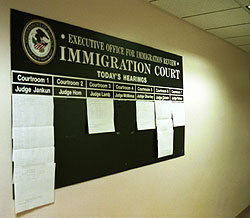7th Circuit Oral Arguments on Motion to Reopen
Yesterday, we argued a case before the U.S. Court of Appeals for the Seventh Circuit for our client, Ms. L. The audio from the oral arguments is below. Ms. L fled China at the age of 19 after she was arrested and beaten for proselytizing and passing out Christian fliers at her high school. She arrived at Chicago's O'Hare airport and requested asylum. She was placed in detention and scheduled for a hearing before an immigration judge. Her family in the U.S. hired a lawyer who failed to appear for the hearing. The immigration judge rescheduled
Red Sox Fans are Not Terrorists
The New York Times published an article today about the government's use of the "material support bar" in immigration proceedings. The so-called material support bar is worth discussing in depth to understand how broad the statutes defining terrorism really are. Under the Patriot Act, any person who provides "material support" to a "terrorist organization" is ineligible for any kind of legal status in the United States. On its face, few would take issue with this law. But the devil is in the details; both "material support" and "terrorist organization" are written so broadly that they can encompass almost any situation. A. "Terrorist
Friday’s Quote of the Day
"As we’ve all learned, [Michele] Bachmann’s strong points are her passion and determination, while her weak ones include a rather free-floating relationship with reality." -Gail Collins, New York Times.
Friday’s Quote of the Day
"The reason being it's a lot easier to fix something if you can see it." -David Foster Wallace, Infinite Jest
Immigration Court = Inefficient Court
In the Supreme Court's case of Demore v. Kim, the government claimed that 85% of cases before an Immigration Court "are completed in an average time of 47 days and a median of 30 days." In that case, the Supreme Court found constitutional the statute which makes detention of some immigrants during removal proceedings mandatory (meaning that no judge has the authority to release the immigrant on bond, no matter what the circumstances). To support its finding, the Supreme Court relied heavily on the government's statistics which supposedly showed that Immigration Court cases were completed very rapidly. Almost all people who
Q&A on the New “Obama Policy”
Where legislation fails, there is always policy. Or at least that’s the Obama administration’s latest approach. On August 18, 2011, the Obama Administration announced that the Department of Homeland Security (DHS) and Department of Justice (DOJ) will work together on a new initiative to focus their resources on the enforcement of “high priority” immigration cases, while clearing “low priority” cases from the administrative docket. In the past few days, we've received many calls asking about this policy. We'll try to provide some insight: -Does the policy apply to me? Unfortunately, like so much else in immigration law, the answer is not straight
Friday’s Joke of the Day, 9/2/11
What do you call a person who is an insomniac, a hesitant atheist, and dyslexic? A person who stays up all night wondering if there is a dog.
Be Careful of “Travel Agencies” and “Notarios”
Unfortunately, there are a lot of people who take advantage of the vulnerable and often desperate position of immigrants. Unscrupulous attorneys, people posing as attorneys, "travel agencies" (in the Chinese community), "notarios" (in the Hispanic community), and other "immigration service" places claim to be able to obtain visas and other legal status for people. More often than not, the immigrants end up spending large sums of money and not obtaining the status promised. Worse, sometimes fraudulent applications are submitted and people who would otherwise be eligible for legal status lose their opportunity and end up in deportation proceedings. With the new
Corruption? Of course.
What do $30,600 in campaign donations to a New Jersey county executive get you? If you’re Community Education Centers, and the county executive is Essex county chair Joseph DiVincenzo, Jr., then the answer is evidently a contract worth 8-10 million dollars annually to run an immigration "detention center" (prison, for those who are less double-speak inclined). Two recent New York Times articles have shed light on a process by which Community Education Centers won a “public bid” to build the new jail in Essex, New Jersey, by beating out approximately ZERO other competitors. Three weeks ago it was announced by Essex





